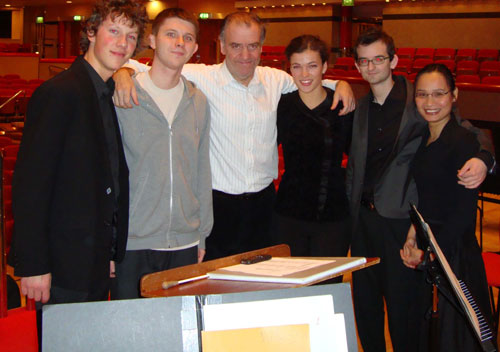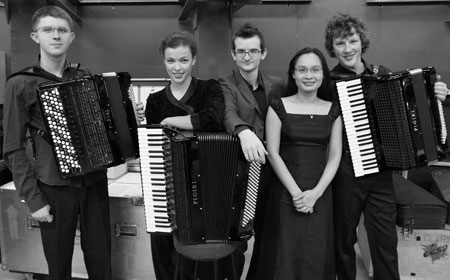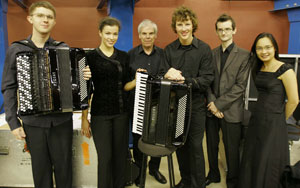
Photo, Left to Right: Martynas Levickis, Rafal Luc, Conductor Valery Gergiev, Ksenija Sidorova, Amadej Herzog and Trang Nguyen.
On October
14/15th 2009, during a long planned visit to the UK, the Chorus of the
famous Mariinsky Theatre gave two splendid performances of Prokofiev's
'Cantata for the 20th Anniversary of the October Revolution'. They performed
with the City of Birmingham Symphony Orchestra, conducted by Valery Gergiev.
In the second half of the programme the Chorus performed Hector Berlioz's
Requiem, 'Grande Messe des Morts'.
Prokofiev's 'Cantata' is an extraordinary work of musical theatre and
of huge proportions in the musical forces it employs. It uses an extended
orchestra and choir, a brass band and an accordion band. From the accordionist's
point of view the work, written in the mid-1930s, is of obvious interest
as it is probably one of the first large orchestral and choral works to
include an accordion band or significant part for a group of accordions.
Fresh light on the significance of the Cantata in the composer's career
has been shed by recent research by Simon Morrison, Professor of Music
at Princeton University and is summarised in his new book, 'The People's
Artist - Prokofiev's Soviet Years' (1). It is well known that Sergey Prokofiev
(1891-1953) left Russia in 1918, via Vladivostok for America, and eventually
in 1923 he settled in Paris.
He thought that the cultural scene in post-revolutionary
Russia would be unlikely to favour his career as a pianist/composer. In
1936 he decided to move back from Paris to Moscow at the peak of his fame
and celebrity in the West. There has been much debate about the reasons
for this move.

Simon Morrison has studied archival material in Moscow and other Russian
cities to add to this debate. He argues that in the 1930s Russia needed
celebrity artists and that Prokofiev was lured into relocating to Moscow
by promises that were not kept. He was promised that his international
career would not be affected. If he lived in Moscow he would be free to
come and go as he pleased.
He was promised immediately several substantial
commissions, one of which was the 'Cantata for the 20th Anniversary of
the Revolution'. Others included a four-act ballet based on Shakespeare's
'Romeo and Juliet' for the Bolshoi Theatre and 'Peter and the Wolf' for
the Moscow Children's Theatre.
The 'Cantata' was commissioned by the Director of the Radio Committee
arts division and an advanced honorarium of 25.000 roubles was made -
a quarter of the final payment (never paid) on completion of the work
to be delivered by October 1936. Prokofiev had his advisors but he was
to provide the libretto for the work as well as the music.
It was the
libretto of the work and the use made of parts of the speeches of Lenin
and Stalin and the Soviet constitution that caused most of the trouble
he had with the censorship processes in the 1930's Soviet Union.
The Committee on Arts Affairs condemned the work as 'dangerous', 'politically
incorrect' and a potentially 'criminal' experiment. The chairman of the
Committee tore into Prokofiev, "Just what do you think you are doing,
Sergey Sergeyvich, taking texts that belong to the people and setting
them to such incomprehensible music?"
Soviet authorities ensured that the work was not performed in Russia until
1965, twelve years after the composer's death and even then in a truncated
form. The composer was deeply affected by what he saw as the waste of
two year's work. The work was first performed in its entirety in June
1992 in London's Royal Festival Hall.
Outside the old Soviet Union the libretto text reads at best obsequious
to a political establishment and at worst jejune (2). Nevertheless the
sound world built around it by one of the 20th century's great composers
is magnificent. A triumph by a composer who never heard it performed.
Whatever the political power of words, in this case the last word is with
the wonderful music.
 For
accordionists to play in a performance of this work is an excellent opportunity.
The opportunity at the performance in Birmingham fell to students of Owen
Murray's Accordion Department at the Royal Academy of Music. For
accordionists to play in a performance of this work is an excellent opportunity.
The opportunity at the performance in Birmingham fell to students of Owen
Murray's Accordion Department at the Royal Academy of Music.
Royal Academy
students are fortunate in the opportunities that fall to them for classical
concert performances.
The photograph shows the students who played with
the conductor Valery Gergiev. The group received a special cheer from
an appreciative audience at the end of the performance.
|